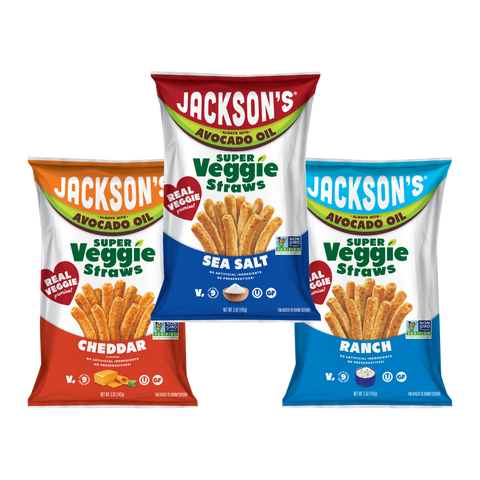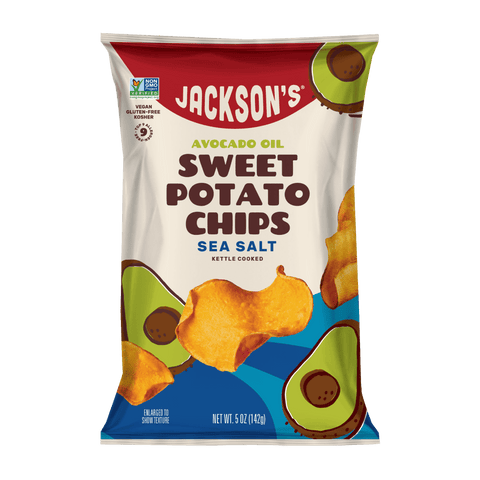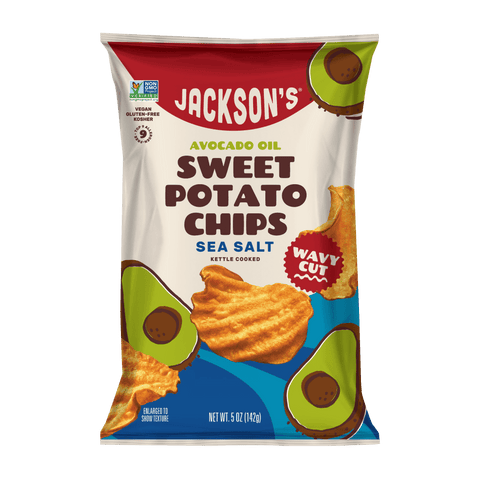What is the difference between Refined and Unrefined Coconut Oil?
Coconut oil is extremely versatile in the ways that we can use it. From hair conditioner, to lotion and it’s many uses in cooking, coconut oil has become a part of everyday life.
There is a big difference between refined and unrefined coconut oil that gives the coconut oil different smoke points, different flavors, and even different uses! Unrefined coconut oil, aka Virgin coconut oil, hasn’t been touched by other chemicals and tastes strongly of coconut. If you have tried Jackson’s coconut oil chips, then you have tasted that sweet and healthy unrefined oil that we use to slow fry our chips at low temperatures. Refined coconut oil doesn’t have as strong of a coconut taste (if any) and it is very useful for frying.
Not only are there different tastes and uses, even the way that each type of coconut oil is processed is very different. In this blog we’re going to go over the different types of coconut oil, their uses, and what they can do for you.

How It’s Made, Coconut Oil Edition
There are so many ways that coconut oil, and oils in general, can be processed. There’s wet, dry, bleaching, extraction, cold, hot, etc. It’s insane! Let’s begin, shall we?
Hot vs. Cold-Pressed Coconut Oil
The only way to tell the difference between these two is by the label. Most visual factors stay the same such as the color, and when the oil is liquid or solid. The major difference is found in the ways that nutrients are kept intact, smoke point, shelf life, and flavor.
Cold-pressed coconut oil doesn’t use any heat to bring out the oils in the coconut. The meat and milk are generally shoved through a very powerful press that pushes everything out of the meat. It is believed that this type of processing keeps the nutrients in the oil.
On the other hand, expeller-pressed or hot-pressed coconut oil is almost like pressure cooking the coconut meat. In this process, steam and heat are used to get the oil out of the coconut. In many cases, heat can change the way chemical bonds form which can change how our body interacts with the nutrients.
Has this been proven? Not necessarily, but there is some evidence to the difference between the oils.
Wet vs. Dry Processing Coconut Oil
Dry processing coconut oil is often done through pressing dried coconut meat which is called copra. This type of drying is done through heat to help the water evaporate.
On the flip-side, wet processing coconut oil is when the fleshy fruit is pressed through a machine, without heat, to get both oil and milk from the coconut. Once the oil and milk are out, they are separated in a few different ways: fermentation, enzymes, or centrifuges.
Refined Coconut Oil
Each of the methods above are used for unrefined coconut oil. Once one of those methods is complete, the coconut oil is then packaged and sold. It isn’t the same case with refined coconut oil. Instead, once the oil is expressed from the coconut meat, it goes through several more steps.
Refining coconut oil means that the oil goes through the dry process, and then goes through additional clays, it’s deodorized through the expeller process, and other chemicals could be added in the process. Below are three of the main ways that coconut oil is refined:
Degumming – The oil is mixed with a degumming agent that removes thickening elements of the oil. This then changes the quality and texture of the oil which makes it a little bit smoother.
Neutralizing – Sodium hydroxide, also called lye, is added to the coconut oil to make soap with the free fatty acids that just float around.
Deodorizing – This step usually occurs in the beginning of the process through the expeller-pressed process. When the oil is heated to a certain temperature, the heat burns off the smell of coconut and can even remove the flavor as well.

Refined Coconut Oil vs. Virgin Coconut Oil
In the grand scheme of things, what does this mean? What does the processing differences, the tastes, all of this, what does it relate to? Well, let's break it down. The choice between refined and virgin coconut oil ultimately connects to your culinary goals and dietary preferences. It's a decision that can significantly influence the outcome of your dishes and your overall cooking experience.
Above all, it relates to what you want. Do you want more nutrition and a tasty coconut flavor? Then you want to work with virgin coconut oil. Virgin coconut oil retains the natural essence of coconuts and offers a more robust nutritional profile. It's perfect for those who relish the delightful tropical notes it imparts to their recipes and wish to enjoy the potential health benefits associated with its unaltered state.
What stays the same and what changes: Nutrition, Flavor, Smoke Point, MCT
This is the easier aspect of telling the difference between refined and unrefined coconut oil! Three major things are going to change: nutrition, flavor, and smoke point. What stays the same is the core of what coconut oil is: regular fatty acids and fatty acids called MCT.
While the nutrition does tend to stay similar, you will lose more micronutrients in refined oils just because of the process of running the oil through clays and other substances. The biggest draw to refined coconut oil is that it is practically tasteless, and the smoke point of refined coconut oil rises to between 400- 450° F as compared to unrefined oil with a smoke point of 350° F.
What stays the same is something called MCT: MCT stands for medium-chain triglycerides. Triglycerides are fatty acids that your body uses for long-term energy. Longer chains are harder for your body to break down and shorter chains are broken down too quickly. Medium chains are just right for the body to break down into energy!
What is MCT?
MCTs, or medium-chain triglycerides, are fatty acids found in coconut oil. They are quickly broken down and absorbed by the body, providing a quick burst of energy. Some studies suggest that MCTs may also have other health benefits, such as aiding weight management and improving cognitive function.

Cooking and Baking with Refined vs Unrefined Coconut Oil
If you are making a dish that would go well with the sweet flavor of coconut, then definitely go for unrefined coconut oil. However, most dishes are going to have other flavors that need to come through: therefore most people reach for refined coconut oil.
It’s important to remember that refined coconut oil, while flavorless, only lasts a few months. If you use the oil past that point, it could be rancid or growing mold. Check for an off smell or a yellow tint to the oil and throw it out immediately for your own safety.
When cooking with coconut oil, unrefined coconut oil is going to be better for sauteing and baking as long as you aren’t going above 350 F. If you are going to be frying or cooking at higher temperatures, then stick with refined coconut oil: the fatty chains aren’t going to break down at those higher temperatures and you’ll still get a great meal with some extra nutrition from the coconut oil. For more information, see our article Can You Use Coconut Oil Instead of Vegetable Oil?.
Conclusion
The last thing to mention about coconut oil, is that it is great for hair and skin. Virgin coconut oil that has been cold pressed is the best to use as a moisturizer for your hair and body. With how versatile the oil is, you may want to pick some up today!
If you want to taste the difference between refined and unrefined coconut oil, pick up a bag of Jackson’s coconut oil chips and a refined coconut oil from the store. What you will taste with the chips is a sweet coconut flavor because we use unrefined coconut oil at low temperatures so that you get the health benefits of both the sweet potatoes and the coconut oil. Try the refined oil with some veggies and you’ll really taste the difference.
Personally? I prefer unrefined coconut oil. Yum!
Try our Coconut Oil Chips HERE.

No Seedy Oils Here
Avocado Oil Goodness Meets Irresistible Flavor - No Seed Oils Here!
-

 8 Pack New Arrival!Variety Pack Super Veggie Straws in Avocado Oil 5oz (Pack of 8)
8 Pack New Arrival!Variety Pack Super Veggie Straws in Avocado Oil 5oz (Pack of 8)Variety Pack
Super Veggie Straws in Avocado Oil
- Size
- 5oz bags
- Regular price
- $35.99
- Sale price
- $35.99
- Regular price
-
$35.99 (Liquid error (snippets/product-price line 131): divided by 0 per bag) - Unit price
- per
-

 8 Pack Best SellerSea Salt Sweet Potato Chips in Avocado Oil 5oz (Pack of 8)
8 Pack Best SellerSea Salt Sweet Potato Chips in Avocado Oil 5oz (Pack of 8)Sea Salt
Sweet Potato Chips in Avocado Oil
- Size
- 5oz bags
- Regular price
- $35.99
- Sale price
- $35.99
- Regular price
-
$35.99 (Liquid error (snippets/product-price line 131): divided by 0 per bag) - Unit price
- per
-

 8 PackWavy Sea Salt Sweet Potato Chips in Avocado Oil 5oz (Pack of 8)
8 PackWavy Sea Salt Sweet Potato Chips in Avocado Oil 5oz (Pack of 8)Wavy Sea Salt
Sweet Potato Chips in Avocado Oil
- Size
- 5oz bags
- Regular price
- $35.99
- Sale price
- $35.99
- Regular price
-
$35.99 (Liquid error (snippets/product-price line 131): divided by 0 per bag) - Unit price
- per
-

 8 PackVariety Pack Kettle Chips in Avocado Oil 5oz (Pack of 8)
8 PackVariety Pack Kettle Chips in Avocado Oil 5oz (Pack of 8)Variety Pack
Kettle Chips in Avocado Oil
- Size
- 5oz bags
- Regular price
- $35.99
- Sale price
- $35.99
- Regular price
-
$35.99 (Liquid error (snippets/product-price line 131): divided by 0 per bag) - Unit price
- per







